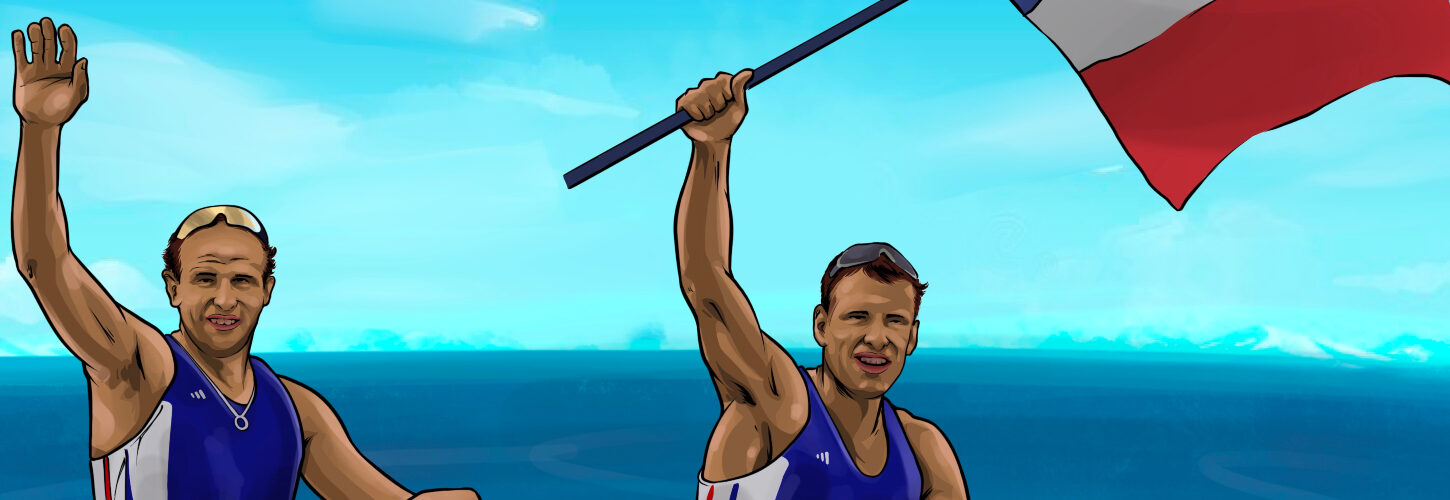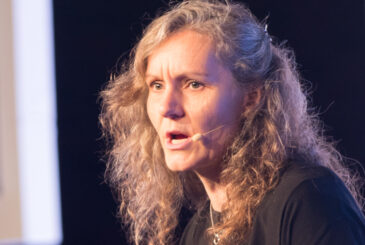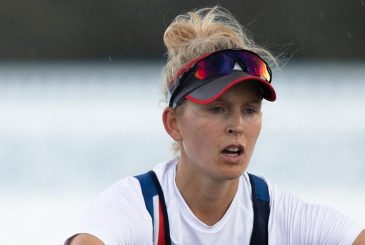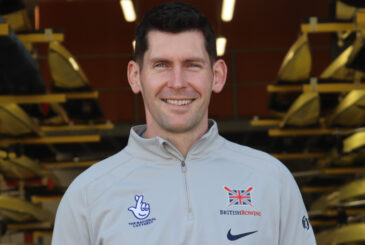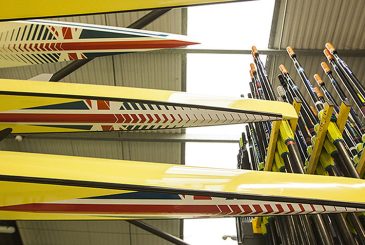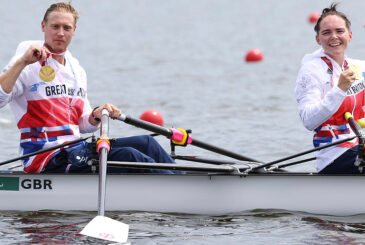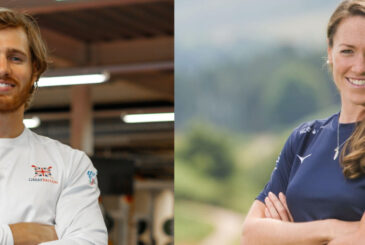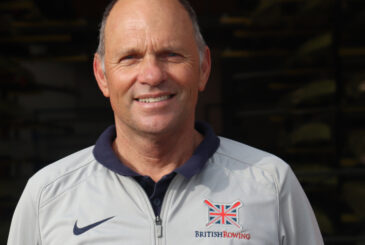In a new series celebrating some of the most dramatic Olympic and Paralympic finals since 2000, Martin Cross selects his top races, reliving the experience with athletes involved. For the first one, let’s rewind to 2000 when the Olympic Games were hosted by Sydney in Australia
The Olympic men’s pairs final at the 2000 Sydney Games is remembered for the incredible courage of the French crew. France’s Jean-Christophe Rolland and Britain’s pair of Greg Searle and Ed Coode reflect on that race with Martin Cross
Some Olympic finals, like the men’s four at the 2004 Games in Athens, become iconic because the race was so close and the British victory over the Canadians was only secured by the narrowest of margins. Others like the Barcelona coxed pairs final in 1992 are unforgettable because of a fabulous sprint finish from the British that overhauled Italy’s apparently unassailable lead.
The Sydney pairs final on Saturday, 23 September 2000 is different, mostly because of what the French pair of Jean-Christophe Rolland and Michel Andrieux decided to do in the middle of the race.
In an inspired moment – the like of which this correspondent has not seen before or since – they began their sprint for the finish from just before the 1,000m mark. It was a tactic that blew the race apart. A race which was, until then, being led by the impressive British pair of Greg Searle and Ed Coode. The British favourites not only lost their lead, but – cruelly – also had to forgo a medal, as the Americans and Australians, rowed them down.
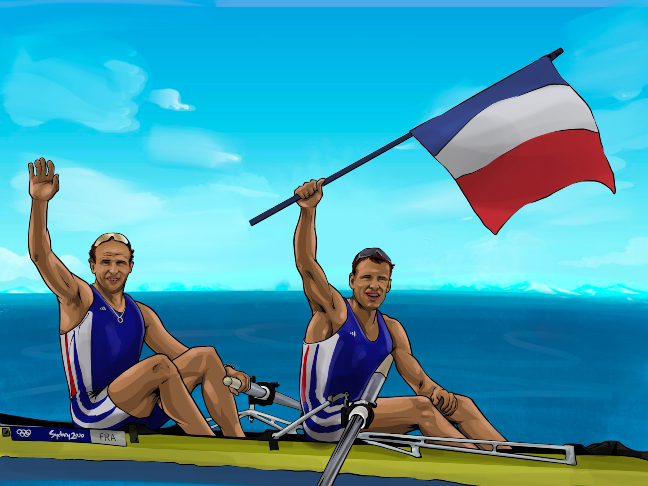
You can watch the race here.
Recently, Jean-Christophe, Greg and Ed got together with me to talk about that race. Jean-Christophe is now President of World Rowing, Greg was the stroke in that epic Barcelona final, who later won bronze in both Atlanta and London. Ed was in that four, which won in Athens. The three men talked about the events that led up to that race, the contest itself and then the impact it had on their lives.
Ed: We had that great training camp on the Gold Coast. It was a special pair – we had some terrific boat speed in competition out there. We reckoned we were a world-beating pair.
Greg: We weren’t put together until quite late, so we didn’t really have enough time together in the pair. We were always searching for consistency. We won at Henley but then didn’t make the final at Lucerne.
JC: In our case, Michel and I had been together a long time, since 1991. But that Olympic season, after we lost to the Jugoslav pair in Munich, we were concerned about how we could make up that gap in such a short period of time. But we always aimed to be at our absolute peak for the objective of the year, be it the World Championships or Olympic Games.
I remember on the pre-Games training camp we had to be careful to stay in our bubble and not let the pressure that was affecting those around us impact our pair.
“This will be the toughest race of our lives and what will make the difference is our mental approach – how much we want to win”
Greg: We got out to Australia and found we had quite a basic race plan and that’s why, JC, you blew us away with something that wasn’t a basic race.
In the final, we did what was normal and we executed it quite well. I remember before the race I had doubts about our speed at the end of the race. In training, we couldn’t get away from the spare pair in the last 500m. And we were always rowed away from in the last 500m by the women’s quad. I also remember being quite nervous you rowed through us in the semi-final.
JC: It was after that semi that we built our strategy for the final. We knew that we would not lead from the start but that we had quite a good finish. But the gap you had was quite significant. We managed to come back, but it was only on the last two strokes. We knew you would go out to take a bigger gap in the final and we decided not to let you get more than a length. But the gap you had at the 500m was quite significant and imposed us to react.
Ed: With over 20 years as a perspective, I watched that final again last night and I thought we were rowing pretty well. Maybe we needed another Olympic cycle as a pair. There aren’t many cases of pairs coming together for just six months and winning the Olympics. But we were aiming to win that race; you can’t go into an Olympic final thinking that you’re not going to win.
Greg was an Olympic champion, and I was a world champion from the year before and our splits in training and racing were good.
Greg: I watched the race again last night too and if you look at our 500m splits of 1:35, 1:40, 1:40 and 1:37 – that’s pretty much what we would have settled for in flat conditions.
“If we did stumble, the difference is that you guys deserved to win that day because you did something that was really amazing”
JC: In the warm-up jog before the race, I said to Michel: “This is the last time we will row together. We have to take risks and provoke something to happen. This has to be done now.”
We knew we could not compete with you at the start, but just before the halfway mark you had over a length of clear water – 2.7 seconds I think – the fact it was more than a length created that burst that we did.
If you had been a little less fast in the first 1,000m we would not have reacted like we did. So, we did 30 strokes, and it was so efficient that Michel just said: “Continue!! Out of all the, maybe, 200 races that we had done this one was different. Always our third 500m was the slowest. But in this race our split for that quarter was the quickest – unprecedented and atypical! We really took the lead too early in fact… But once you reach that point, it’s difficult to calm down, so we had to manage it till the end of the race.
Ed: I just remember JC and Michel going through us so quickly and that caused us to stumble. They did a masterclass of tactical racing. It was the one thing we didn’t need happening to us.
JC: In the last 500m we just had to hang on. Before the race I shared with Michel that this will be the hardest and toughest race of our lives and what will make the difference with our opponents is our mental approach – how much we want to win.
To create an emotion that would take us further than we would normally go, we could call the names of our sons, who were alongside the course. Victor, my son, was 14 months at that time. I was completely exhausted…. And I must humbly admit that it was the emotion created by Michel saying: “Pour Victor!” that took me to the last stroke.
Greg: If we did stumble, the difference is that you guys deserved to win that day because you did something that was really amazing.
In my dark moments I think we really should have got silver. I didn’t think we’d lose to the Australians and Americans. Who knows if what you did was the difference between the 30cm between second and fourth place?
JC: I would not suggest replicating our strategy. You can’t plan something like that. To be honest, I would not like to be back at the start again. One thing that surprised me is that people still talk about that race more than 20 years later. Some athletes who were not born at the time have spoken to me about that race and I know that coaches speak about that race to show mental strength and provoke a little bit of emotion.
Greg: One bit of colour was how painful it was coming home from Sydney on a plane full of medallists, who all went in club class. I went down the back. At Heathrow there were so many people waiting, but I just sneaked off with my trolley.
Ed: That race had a real impact on me. It’s generous to hear JC say that he wouldn’t want to sit on the start again, but that was the overwhelming feeling that I had afterwards. I just wanted to race that Olympic final again. I feel like I fluffed my lines. Then you’ve got another four years to wait and that emotion I felt then, I carried with me every day for the next four years.
Greg: The best I felt was when I won. The worst I felt was when I came fourth. But it’s amazing to be part of this sport of rowing that brings people together. We have this massive, shared, experience in rowing more than any other sport. You totally win it together and it’s given me perspective on other things in my life.
JC: For me, the best memories were the emotions we shared after the race. We had a significant group of family and friends out there.
“The race certainly changed my life”
The day I came back to work at the nuclear power plant was amazing. I still have the emotion now. They were almost all there – maybe 1,000 people there, who had shared in my journey – and to see your colleagues in tears: wow! Just wow!
The race certainly changed my life – not as a person, I remain who I am. But the way you are, the way you behave in your career life has been built by your journey as an athlete and that has been a fantastic part of my life. It’s why I decided to give back to the sport, which gave me so much in my life. I am to a certain extent where I am now because of that race. If we had come fifth or sixth, I don’t know what would have happened to my life.
Greg: That race had another impact. In 2009, I was commentating for World Rowing at the Poznan World Championships. JC and I were both supposed to fly back to London, but our flight was cancelled.
We were in the airport with all the rowing world passing us by and we started talking about Sydney and that race. We had to leave the airport and then, back in the hotel, we had dinner together and the conversation continued. It was one hundred percent because of that conversation that I decided to make a return to the sport for London. If we hadn’t have been delayed, I wouldn’t have had time to think. I was busy, had a good job and family. But it gave me a chance to press the ‘pause button’ and think maybe I could do the Olympics again in 2012 and the rest is history.
Illustration by Syahrulhart / Fiverr


